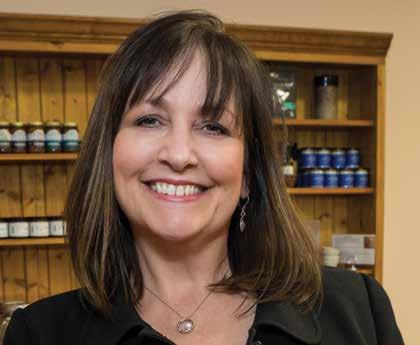
6 minute read
WBOC
Donna Glassberg
It is not a secret that the COVID-19 has affected the Central New York economy. Businesses are now faced with challenges that owners have never experienced before and are navigating an uncharted future. But local business owners are not alone in the pandemic.
Even during unprecedented times, organizations like the Women Business Opportunities Connection continue to work hard, promote local businesses, and help its diverse array of members. The organization continued to host events online and safely distanced and have even accepted new members. Businesswomen Donna Glassberg of Orange Housing, Dr. Sarah F. Spiegelhoff, Ph.D, LMHC, NCC, Sheila Ohstrom of Senior Home Care Solutions, and Nicole Samolis of SKY Armory, Epicuse, and The Events Company face different challenges within their own services, but—as part of the WBOC—they have been able to face those challenges together.
“With the shelter in place order on March 13th, we lost so many clients that we normally work with in two weeks.” Ohstrom said when asked about how the pandemic affected her business, “Many of our clients we take care of while their families are at work were now home and or furloughed and could be there for their parents in place of us. They were also concerned about paying for the services if things got worse.”
“The hospitality industry is one of the hardest hit during the pandemic.” Samolis added, “We’ve had to be nimble in working with information at hand and keep our clients informed and keeping their business on the books rather than losing it outright. Epicuse on the other hand has been our silver lining as it was deemed an essential business and we’ve been a food resource to not only the downtown residents but to people in the ‘burbs who want to avoid the big grocery stores.”
“COVID-19 has left us with many unknowns, which has created symptoms of anxiety and depression for many New Yorkers,”
Nicole Samolis

Dr. Spiegelhoff said. “Consequently, I’ve continued to work with existing and new clients, providing counseling and wellness services. The difference has been that I transitioned all of my clients to telehealth and only slowly began seeing a minimal number of clients in person.”
As the pandemic began to affect business in Central New York, business owners had to make proper changes to ensure that their businesses could survive and continue serving the community. In many cases, technology became a saving grace.
“It’s much harder to show properties in person to renters and buyers.” Glassberg said, “For this reason pictures matter more than ever. So I did some work on the way the pictures get uploaded to my site. I also invested in a 360-degree camera to see if that helps renters view the properties.”
“Fortunately I have been offering HIPPA compliant telehealth services since 2019,” Dr. Spiegelhoff explained. “So I was familiar with the technology. Most of my clients have appreciated telehealth as it creates a barrier of safety. Since returning to my office, I have created several changes to ensure the health and safety of my clients. These changes include air purifiers with HEPA filters and UV-C lights, [and] hand sanitizer stations.”
“We were never able to stop doing business. Our employees were never able to shelter in place.” Ohstrom added, “We work with the most vulnerable population and it’s very unsettling. We lost all of our dementia training that we provide to facilities all across New York State as it was very hands on. So we have reworked the training for a virtual world and will start to ramp up in August for that.”
Other businesses did not have the ability to use technology to provide their services. Some businesses had to make the most of what their business already had and could provide. Samolis’s business—along with others in the hospitality industry— is one of those businesses.
Sheila Ohstrom

“Our greatest need is to get back to the business of events, safely.” She said, “We continue to revise our re-opening plan to meet the safety concerns and advocate for ourselves. We want to be a model to show that people can celebrate milestones safely.”
More obvious changes to how business owners operate their businesses include things that have now become common practices in pandemic America. Using mandatory masks, providing hand sanitizer, and making sure that there is a healthy stock of disinfectant products have become contemporary safety concerns. The business owners of the WBOC have worked together to ensure that all of their members have had access to these necessary resources.
“We hunted down hand sanitizer, surface cleaners, and masks during a time when no one could get them.” Ohstrom said, “I reached out to friends and had two kinds of masks made and delivered them to every employee. I bought hand sanitizer from Beak & Skiff and have continued to buy from them. I called Nicole Samolis and asked if she could get me some kind of surface cleaner for the homes we work in. Were it not for my colleagues, I would not have been able to get these items for my employees.”
Others like Glassberg have discovered other creative ways to help fellow entrepreneurs in Central New York. Developing the Team Syracuse link—a free link that can be added to a business’s website that will help area companies be easier to find via online search engines—has helped Glassberg help the local economy during these unprecedented times.
“This concept was created with the intention of raising the Google search rankings for everyone in the network.” She explained, “I am hoping to add many more local businesses so we can work together to achieve this goal. Our community is stronger working together.”
Though the businesswomen of the WBOC have maintained a constant network of support for business in Central New York,
Dr. Sarah F. Spiegelhoff, Ph.D.

like everyone in the country, these leaders of local business are still faced with uncertainty.
“I worry.” Ohstrom stated, “Many businesses will not recover from this. Many families will not recover from not being with their loved ones during this time. The future is very unsettled and we will continue to see the effects for many months with closings, loss of jobs, and a possible second wave of COVID.”
But she also reminds us that there is still hope despite the current challenges.
“We are strong and will continue to take care of people as true caretakers and vested in the families they help.”
“I am grateful for being able to serve the CNY community during this challenging time.” Dr. Spiegelhoff said, “I am aware that the pandemic will create ongoing anxiety, depression, and trauma for many. I want readers to know that it is okay to experience anxiety and fear during this time, as well as it is okay to ask for help.”
“Now more than ever it’s important to support our local businesses.” Glassberg replied, “I’m saddened for the businesses that have been hit hard financially. On the other hand, I know Syracuse has lots of hard working, talented folks that will rise above this painful and challenging time. Most great businesses solve a problem and right now we have lots of problems to solve.”
“I’m a highly optimistic person and one who likes a good challenge.” Samolis added, “Great innovation comes from a great need. The creativity and spirit of our local entrepreneurs has been inspiring. We will survive this and be stronger and more profitable.” If there is anything that women of the WBOC can teach all of us, it is that each of us becomes stronger when we work and support one another. SWM










